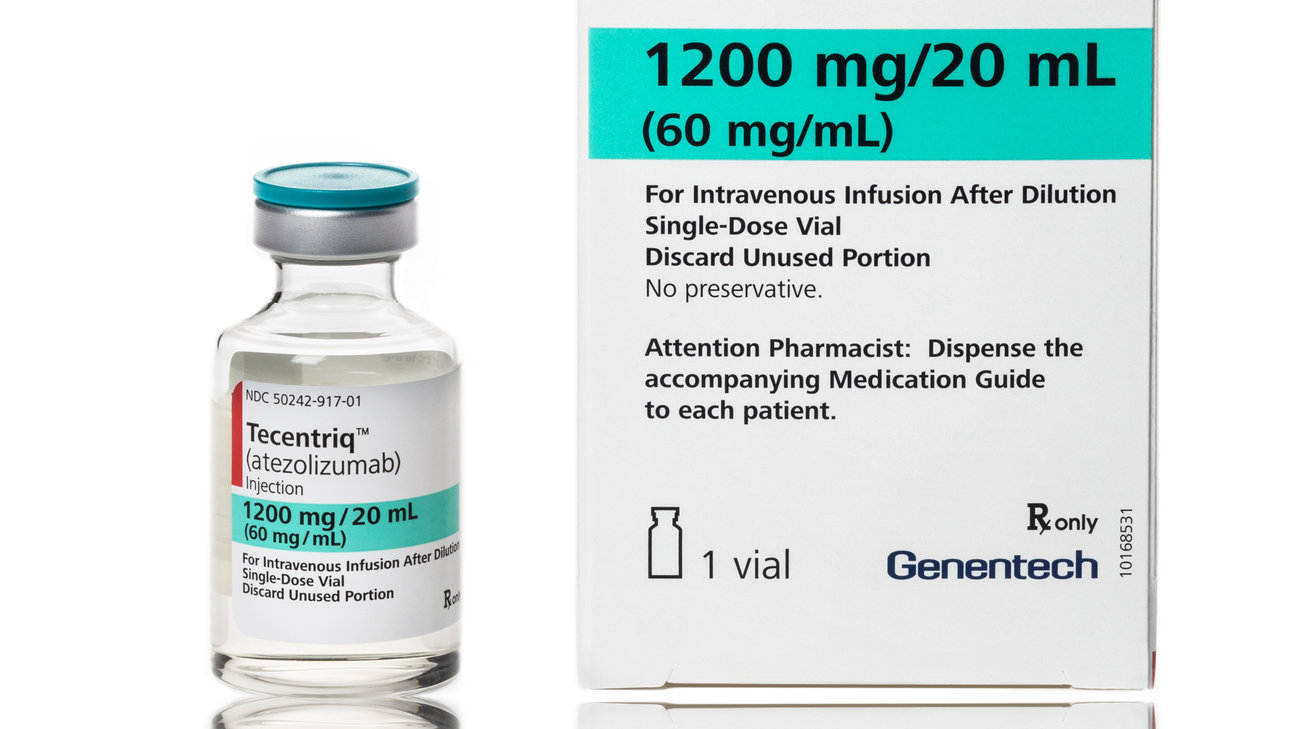Tecentriq (Atezolizumab) vs Krazati (adagrasib)
Tecentriq (Atezolizumab) vs Krazati (adagrasib)
Tecentriq (atezolizumab) is an immune checkpoint inhibitor specifically designed to target and bind to the PD-L1 protein on tumor cells and immune cells, blocking its interactions with PD-1 and B7.1 receptors; this can potentially enable the activation of T-cells and the body's natural immune response to fight cancer. Krazati (adagrasib) is a small molecule designed to target KRAS G12C mutations, which are specific genetic alterations found in some cancers, and it works by irreversibly inhibiting the KRAS G12C protein to stop tumor growth. When deciding between Tecentriq and Krazati, it is crucial to consider the specific type of cancer and its genetic makeup, as Tecentriq is broadly used for various types of cancer, including lung and bladder cancer, while Krazati is tailored for tumors with the KRAS G12C mutation, such as certain non-small cell lung cancers.
Difference between Tecentriq and Krazati
| Metric | Tecentriq (Atezolizumab) | Krazati (adagrasib) |
|---|---|---|
| Generic name | Atezolizumab | Adagrasib |
| Indications | Urothelial carcinoma, non-small cell lung cancer, triple-negative breast cancer, hepatocellular carcinoma, and others | KRAS G12C-mutated non-small cell lung cancer |
| Mechanism of action | PD-L1 inhibitor, immune checkpoint inhibitor | KRAS G12C inhibitor |
| Brand names | Tecentriq | Krazati |
| Administrative route | Intravenous infusion | Oral |
| Side effects | Fatigue, nausea, cough, shortness of breath, decreased appetite, etc. | Nausea, vomiting, diarrhea, increased liver enzymes, fatigue, etc. |
| Contraindications | None known beyond hypersensitivity to atezolizumab or its excipients | None known beyond hypersensitivity to adagrasib or its excipients |
| Drug class | Monoclonal antibody, cancer immunotherapy | Small molecule, kinase inhibitor |
| Manufacturer | Genentech (Roche) | Mirati Therapeutics |
Efficacy
Tecentriq (Atezolizumab) Efficacy in Lung Cancer
Tecentriq (Atezolizumab) is an immune checkpoint inhibitor, specifically a programmed death-ligand 1 (PD-L1) blocking antibody, that has been approved for the treatment of several types of lung cancer. Its efficacy has been demonstrated in non-small cell lung cancer (NSCLC) as both a first-line and second-line treatment. In the first-line setting, Tecentriq has been shown to improve survival when combined with chemotherapy in patients with advanced NSCLC whose tumors express PD-L1 on ≥50% of tumor cells. The drug has also been used effectively as monotherapy in patients with high PD-L1 expression, leading to improved overall survival compared to chemotherapy alone.
In the second-line setting, Tecentriq has shown efficacy in patients with NSCLC who have previously received platinum-containing chemotherapy. Studies have indicated that Tecentriq can prolong survival in these patients compared to docetaxel, a standard second-line treatment. The benefits of Tecentriq are particularly notable in patients with high PD-L1 expression, but improvements have also been observed in the broader NSCLC population, irrespective of PD-L1 status.
Krazati (Adagrasib) Efficacy in Lung Cancer
Krazati (adagrasib) is a newer medication that targets a specific mutation in the KRAS gene, known as KRAS G12C, which can drive the growth of cancer cells. While Krazati has shown promise in early clinical trials for treating NSCLC with the KRAS G12C mutation, as of the knowledge cutoff in early 2023, it has not yet received approval from regulatory agencies for this indication. The efficacy of adagrasib is being evaluated in ongoing clinical trials, and preliminary results have shown that it can induce tumor shrinkage in a significant proportion of patients with KRAS G12C-mutated NSCLC.
The clinical trials for Krazati are particularly important because the KRAS G12C mutation has historically been difficult to target with existing therapies, and the development of adagrasib represents a potential new treatment option for patients with this challenging mutation. As research continues, the full efficacy profile of Krazati in lung cancer will become clearer, and it may offer a new line of therapy for patients with limited treatment options.
Regulatory Agency Approvals
Tecentriq
-
European Medical Agency (EMA), European Union

-
Food and Drug Administration (FDA), USA

-
Health Canada

-
Pharmaceuticals and Medical Devices Agency (PMDA), Japan

-
Therapeutic Goods Administration (TGA), Australia

-
Medsafe (NZ)

Krazati
-
Food and Drug Administration (FDA), USA

Access Tecentriq or Krazati today
If Tecentriq or Krazati are not approved or available in your country (e.g. due to supply issues), you can access them via Everyone.org.
How it works

Make an enquiry
Choose the medicine you want to buy, answer a couple of questions, and upload your prescription to speed things up. We’ll get back to you within 24 hours.


Make an enquiry
Choose the medicine you want to buy, answer a couple of questions, and upload your prescription to speed things up. We’ll get back to you within 24 hours.


Breeze through the paperwork
We'll guide you through the required documents for importing unapproved medicine, ensuring you have all the necessary information.


Get a personalized quote
We’ll prepare a quote for you, including medicine costs and any shipping, administrative, or import fees that may apply.


Receive your medicine
Accept the quote and we’ll handle the rest - sourcing and safely delivering your medicine.

Some text on this page has been automatically generated. Speak to your physician before you start a new treatment or medication.
Let's talk
If you have any questions, call us or send us a message through WhatsApp or email:
Contact us




